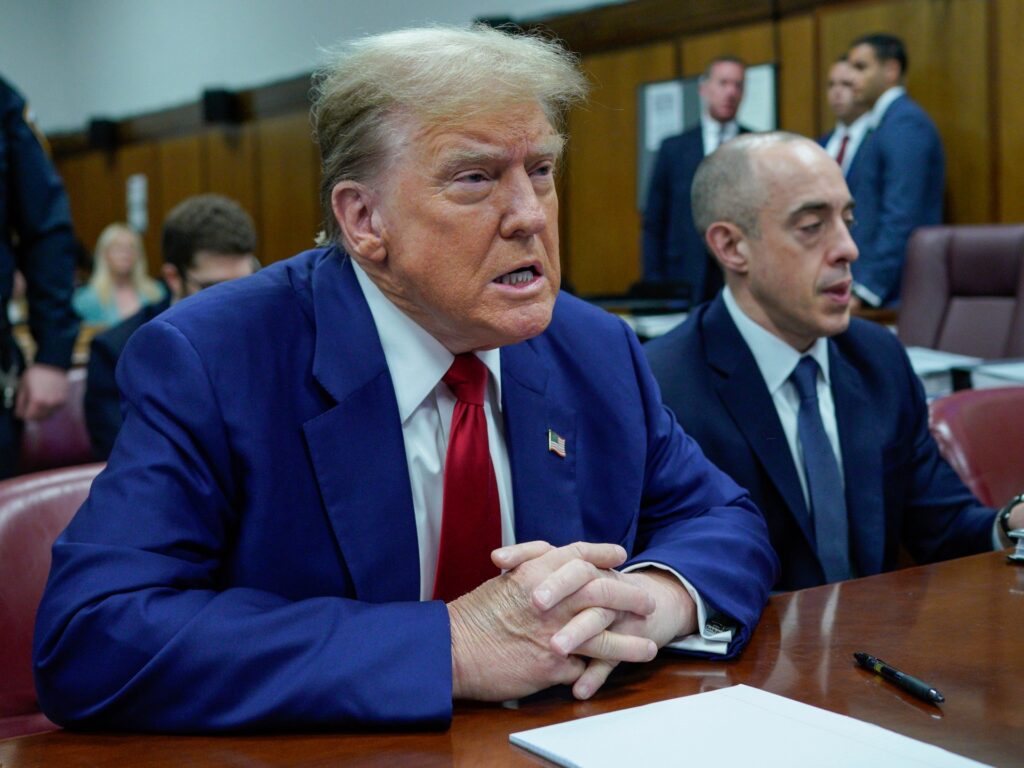The judge in Donald Trump's New York hush-money trial has charged the former president with contempt of court for repeated violations of the gag order.
The order prohibited President Trump from speaking publicly or posting on social media about individuals involved in the trial.
Judge Juan Melchan said Tuesday that Trump violated the order nine times. He fined Trump $1,000 for each violation. Nine of the comments were found to be in violation of the order, resulting in a total fine of $9,000.
Prosecutors have detailed 14 possible violations to the court, and Marchan may make further decisions at Thursday's hearing.
The judge also ordered Trump to remove seven “offensive posts” from his Truth Social account and two from his campaign website by Tuesday afternoon.
He added that he “hereby warns President Trump that courts will not tolerate continued willful violations of legal orders and will impose prison terms if necessary and appropriate under the circumstances.” Ta.
However, Trump posted on Truth Social during the trial that day, complaining about the trial and criticizing some of the key players in the trial.
“This is a complete witch hunt,” he wrote, particularly blaming the judge. “Marchan is dishonest, crooked, and most of all, without a doubt, conflicted.”
historic trial
The decision to fine President Trump came as his criminal trial entered its third week. The former president faces 34 felony counts of falsifying business records in connection with allegations that he paid hush money to adult film star Stormy Daniels, who claims she had a sexual relationship with Trump.
Many of the gag order violations involve Daniels and Trump's former lawyer Michael Cohen. Both men are expected to testify at trial.
Trump is prohibited not only from attacking witnesses, but also from attacking jurors, court officials, or their relatives.
The charges against Trump relate to $130,000 that Trump allegedly repaid to Cohen after his lawyer paid hush money to Daniels.
President Trump has denied having a sexual relationship with Daniels. His lawyer argued that he was acting within the law to avoid embarrassing his family.
But to establish a felony, prosecutors would have to convince a jury that Trump falsified records for another crime. They claim the crimes include illegal efforts to influence the 2016 election, which he ultimately won over Democratic candidate Hillary Clinton.
Mr. Trump is currently the presumptive Republican candidate for the 2024 presidential election. The New York trial is the result of one of four criminal charges Trump currently faces. The remaining three have not yet proceeded to trial.
Regardless of the outcome, the case is historic, making Trump the first current or former U.S. president to face criminal charges.
A new witness takes the stand
Tuesday marked the beginning of a second week of witness testimony, following several days of testimony from former tabloid publisher David Pecker last week.
Pecker, a former National Enquirer reporter, said he had struck a deal with Trump to be the “eyes and ears” of his 2016 presidential campaign. He also testified that he worked with Cohen to suppress negative coverage of Trump before the election.
Testimony continued Tuesday with the return of Gary Faro, the banker who helped open the account into which the hush money was allegedly transferred.
He told prosecutors that his understanding was that these accounts were for real estate transactions.
Faro also said he would not have opened the account if he had known it was for political purposes or to reward adult film performers, adding: “You might consider that to be a reputational risk.” .
Three new witnesses then took the stand. One of them, Robert Browning, is the archives director for CSPAN, a nonprofit television network that provides uncut footage of government proceedings and other public events.
He was called upon as a “keeper of records” to verify the reliability of evidence. Prosecutors also played CSPAN footage in which Trump denies allegations of sexual misconduct and calls Cohen a good friend.
Another witness, Philip Thompson, was asked to certify the record as well. This time, it was court records from Trump's civil libel trial, submitted by author E. Jean Carroll. She had accused President Trump of attacking her reputation after she came forward with an alleged sexual assault.
Attorney Daniels testifies
However, the third testimony came from someone more closely involved in the hush money case.
Keith Davidson was the lawyer for Daniels and Playboy model Karen McDougal at the time of the hush money payment scandal. Like Daniels, McDougal also claimed to have had an affair with Trump, a claim the former president denies.
Prosecutors asked Davidson to screen text messages he exchanged with the publisher of the National Enquirer for review.
In one text, Davidson offered to pitch McDougall's story to the Enquirer. The editor there responded: You know why. “
Davidson also said he was asked to contact Cohen, Trump's lawyer, directly during negotiations with the publisher. “I certainly thought it was strange,” Davidson told the court.
He said one possible explanation for the deal is that “there is collusion between David Pecker and Donald Trump, and it could hurt Donald Trump. “I would not publish an article that does so.''
Mr. Davidson also described the negotiations for the Enquirer to purchase the rights to Mr. Daniels' article, and how closely Mr. Cohen was involved in the process.
“Essentially, Michael Cohen stood for AMI,” Davidson said, referring to the acronym for American Media Inc., the Enquirer's parent company at the time.
But the lawyer expressed an aversion to working with Mr. Cohen, describing him as difficult.
“Every time I talked to Michael Cohen, he relied on his close relationship with Donald Trump,” Davidson said. “It was part of his identity. He let me know at every opportunity that he was working for Donald Trump.”


